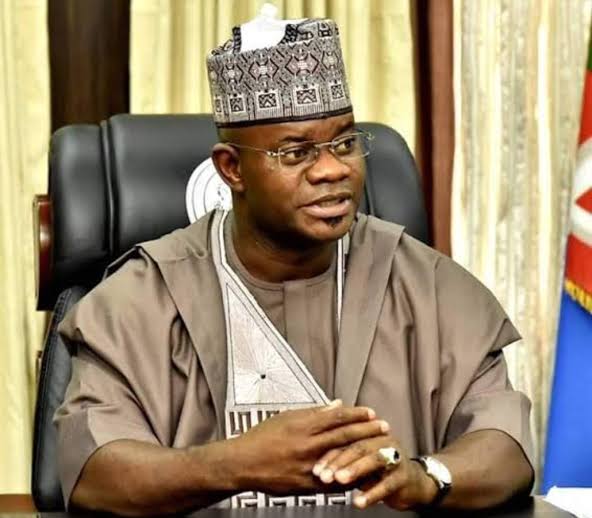Yahaya Adoza Bello CON is a Nigerian entrepreneur and politician.
He held the position of governor of Kogi State from 2016 to 2024, representing the All Progressives Congress. Bello maintained the distinction of being Nigeria’s youngest governor during his tenure.
Early life and Education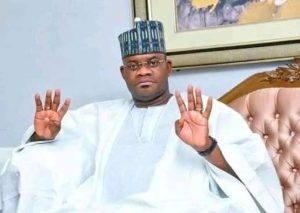
Bello, born on June 18, 1975, in Okene, Kogi State, is the youngest among six siblings. His educational journey began at Local Government Education Authority (Nigeria) (LGEA) Primary School, Agassa, where he excelled, eventually becoming the head boy. He continued his studies at Agassa Community Secondary School and obtained his certificates from Government Secondary School in Suleja, Niger State. Bello pursued higher education at Kaduna State Polytechnic and Ahmadu Bello University, earning an accounting degree in 1999 and a Master of Business Administration in 2002. In 2004, he became a chartered fellow of the Association of National Accountants of Nigeria. Alongside his academic pursuits, Bello is passionate about sports and fitness, particularly boxing.
Career
Bello emerged as the victor in the 2015 Kogi gubernatorial election, selected by the All Progressives Congress following the passing of Abubakar Audu, the initial winner. Securing a second term, he won the 2019 election, defeating PDP candidate Musa Wada with a significant margin. His reelection solidified his status as the youngest governor in Nigeria and the only one born after the Nigerian Civil War. Victory Obasi pledged support for Bello’s presidential bid in 2023, which he officially declared on April 2, 2022, in Abuja. His candidacy garnered backing from the Bello Ambassadors Network, led by Edogbo Anthony, boasting over two million registered Nigerian members.
Controversies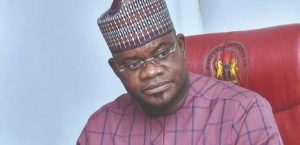
On September 14, 2020, Yahaya Adoza Bello was among a group of politicians sanctioned with a visa ban by the United States Department of State for their alleged roles in undermining democracy in Nigeria. While some activists lauded the decision and urged other nations to follow suit, Bello criticized the United States, claiming the 2019 Kogi State gubernatorial election was largely peaceful and fair despite widespread reports of violence and fraud. He denied allegations that he incited violence during the election with a chant imitating gunfire.
In 2020, Bello repeated the chant during a rally for Rotimi Akeredolu’s re-election campaign in Akure, Ondo State. The chant drew condemnation from the PDP, which accused Bello of deploying thugs to intimidate voters. Bello refuted the accusation, accusing the PDP of spreading falsehoods.
During the COVID-19 pandemic, Yahaya Adoza Bello made controversial statements, including falsely claiming the virus was “an artificial creation” or denying its existence. His government was accused of suppressing testing and clashing with health authorities to keep case numbers low. Bello refused to wear masks at public events, including meetings with President Muhammadu Buhari and at important gatherings like funerals. He also disputed the cause of death of individuals from COVID-19, spreading misinformation about the virus.
In October 2020, Bello stated he turned down a ₦1.1 billion support fund from the World Bank, citing his belief that COVID-19 was “glorified malaria.” Despite this, he acknowledged receiving ₦1 billion from the Federal Government for COVID-19 recovery efforts.
Bello dismissed the rising second wave of COVID-19 in Nigeria in his 2020 New Year’s Eve address, claiming Kogi was “coronavirus-free” and opposing vaccinations, contrary to scientific consensus. He falsely accused vaccine makers of wanting to introduce deadly diseases. His remarks sparked widespread condemnation, including from the Nigeria Governors’ Forum, as they were seen as purposeful misinformation about vaccines.
In April 2021, Kogi State Commissioner for Information Kingsley Fanwo announced that Bello received an honorary professorship from St Thomas-a-Becket University in fields including humanitarian services, human resources management, and peace-building. However, an investigation by Sahara Reporters revealed that St Thomas-a-Becket University does not award recognized UK degrees nor offer courses in the mentioned fields. This suggests that the validity of the honorary professorship conferred upon Bello may be questionable.
In his initial days as governor, Bello approved significant spending, including ₦260 million in security funds and over ₦148 million for office renovation and furnishing at Government House. These approvals were made swiftly in response to requests from the Permanent Secretary in the Government House, Ilemona John. Despite concerns raised about the magnitude and pace of spending, Kogi State Commissioner for Information Kingsley Fanwo defended the actions, citing the need to address insecurity in the state and make Government House suitable for habitation. However, in 2020, Fanwo denied that Kogi State owed Maj Global Construction Company more than ₦100 million, despite their claim of unpaid bills totaling ₦726 million.
Yahaya Adoza Bello’s administration faced allegations of corruption soon after taking office in 2016. Social-political groups, Kogi in Action and Egalitarian Mission for Africa, accused the administration of fictitious withdrawals and contract inflation. They reported these allegations to the Economic and Financial Crimes Commission (EFCC), expressing frustration over perceived inaction.
In February 2021, scrutiny of the Kogi State budget for that year revealed significant allocations for COVID-19 countermeasures, despite Bello’s previous denial of the virus’s existence. The budget included allocations for various COVID-19 response initiatives, raising concerns about corruption within the administration. An investigation by Premium Times further highlighted discrepancies in the allocation and distribution of funds, particularly in agriculture-related COVID mitigation programs. Farmers reported receiving little to no assistance despite the budget allocations.
Additionally, the Anti-Corruption Network released a report accusing Bello of laundering billions of naira in public funds and filed a petition against him with the EFCC. The report detailed alleged corruption spanning multiple years, including irregularities in contract awards and money laundering. The EFCC announced an investigation into the allegations, but as of July, there was no reported progress, prompting criticism from the Anti-Corruption Network. Bello’s administration dismissed the allegations as politically motivated.
On March 26, 2021, Premium Times revealed that the Kogi State government had allegedly spent over ₦90 million on COVID-tracking software, despite minimal anti-COVID measures being implemented. Financial records indicated that the government purchased a year of COVID-19 risk-assessment software for ₦90,720,000 in March 2020, while similar projects were quoted at significantly lower costs.
Telnet Technology, the company awarded the project, stated that a similar app would cost only ₦300,000 for one year. Despite this, Kogi State Commissioner for Information Kingsley Fanwo insisted that the project cost less than a million naira, but failed to explain the discrepancy with the reported payment of over ₦90 million.
The Premium Times report prompted calls for investigation, with organizations like the Socio-Economic Rights and Accountability Project (SERAP) urging President Buhari to direct relevant agencies to investigate the alleged misuse of funds, including the substantial payment for the COVID-tracking software.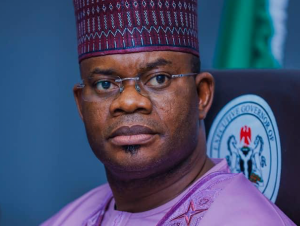
On August 31, 2021, the Lagos Division of the Federal High Court froze the Kogi State Salary Bailout Sterling Bank fixed account following an application from the EFCC. The EFCC alleged that the account was unlawfully funded with ₦20 billion from a state government loan account in July 2019 and had not been utilized for civil-servant salary payments. The court granted the EFCC’s motion to freeze the account pending investigation and potential prosecution.
Sterling Bank responded, stating that Kogi State had no fixed account with them and clarified that the mentioned account was an internal number used for managing Kogi State accounts. The Bello administration denied the allegations, emphasizing that they had no fixed accounts in Sterling Bank and accusing the EFCC of misleading the judiciary and the public. Governor Bello termed the case a “misrepresentation of facts” and denied any freezing of Kogi state accounts.
In November 2021, the Central Bank of Nigeria confirmed the receipt of around ₦19.3 billion in Kogi State salary bailout funds recovered by the EFCC. However, Kogi State Commissioner for Information Kingsley Fanwo rejected the notion that the money belonged to the state government, dismissing the EFCC’s report as “mischievous, false, and politically motivated.” Subsequently, on December 12, the state government sued the EFCC for ₦35 billion in damages over the commission’s statements regarding the issue.
Legal issues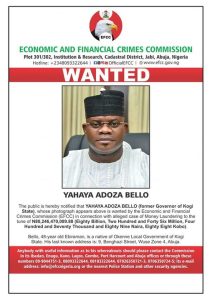
The Economic and Financial Crimes Commission (EFCC) has declared the former governor wanted for alleged economic and financial crimes. The announcement was made via a notice posted on the commission’s official Facebook page. Bello is wanted in connection with a case of money laundering totaling N80,246,470,089.88.
The notice also provided Bello’s last known address as 9 Benghazi Street, Wuse Zone 4, Abuja, and urged anyone with information about his whereabouts to contact any of the commission’s offices across the country.
Furthermore, the EFCC had announced its intention to arraign the former governor before a Federal High Court in Abuja on Thursday.
Following the issuance of a warrant of arrest by the Federal High Court in Abuja, the EFCC’s legal team, led by Kemi Pinheiro, SAN, stated during the proceedings on Thursday that EFCC operatives were ready to execute the arrest warrant for the former governor, Yahaya Bello, even if it necessitated the use of force.
Pinheiro emphasized that they were determined to arraign Bello in court, regardless of the means required, stating, “We have to arraign him in court even if we have to use the military. Immunity is only attached to a person and not the building.”
Pinheiro reiterated that the law permits the use of necessary force, including breaking down walls, to arrest an evading defendant, citing Section 284 which mandates all persons to obey the service of a charge.
In a separate incident, armed men, identified as “Special Forces,” and officers from the Nigeria Police Force intervened at Bello’s residence in Abuja on Wednesday to prevent EFCC operatives from apprehending him. Reports from PUNCH Online stated that the current governor of Kogi State, Usman Ododo, intervened to halt the arrest of the former governor. Ododo’s team escorted Bello from the location in the governor’s vehicle.
Bello, along with three other suspects named Ali Bello, Dauda Suliman, and Abdulsalam Hudu, are scheduled to be arraigned before Justice Emeka Nwite. They are facing 19 counts related to money laundering amounting to N80,246,470,088.88.
Net Worth
Estimated to be 20 million dollars


